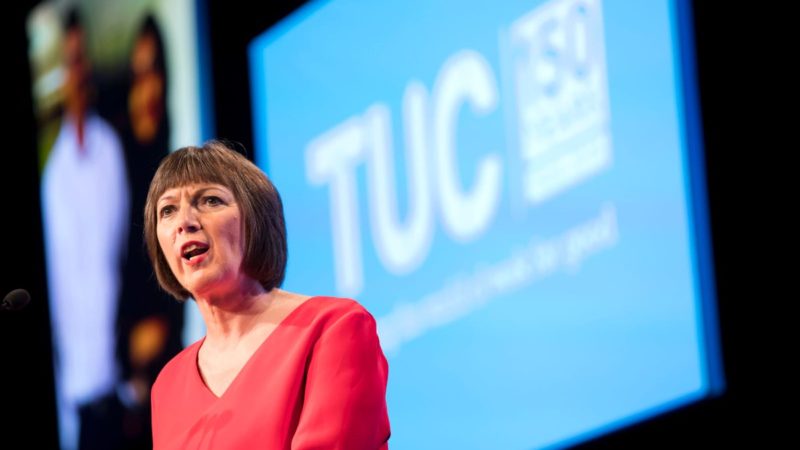
Frances O’Grady has warned that public sector staff are at “breaking point” over pay and conditions after polling revealed that almost one in three key workers have taken steps to leave their profession or are actively considering changing fields.
The polling from the TUC, carried out by YouGov, found that 32% of key workers in the public sector are seriously considering quitting their jobs and changing sectors – equivalent to 1.8 million workers according to TUC analysis.
The survey reported that 34% of key workers in the education sector have taken steps to move professions or are actively considering it, while the figure for workers in the health sector was 31%.
The TUC warned the government that public services are facing a “mass exodus” of key workers unless ministers offer “decent pay rises”. 45% of key workers in the public sector reported that the government’s stance on pay has made them more likely to leave their job in the next one to three years.
O’Grady said today: “Key workers in the public sector helped get the country through the pandemic. But many are now at breaking point because of a toxic mix of low pay, unsustainable workloads and a serious lack of recognition.
“After years of brutal pay cuts, nurses, teachers, refuse workers and millions of other public servants have seen their living standards decimated – and now face more pay misery. It is little wonder morale is through the floor and many key workers are considering leaving their jobs for good.”
The TUC is urging the government to prioritise key worker pay and public services funding in its fiscal event on November 17th. The union body is demanding that ministers give key workers in the public sector “cost-of-living proofed” pay rises and that the minimum wage be raised to £15 an hour as soon as possible.
The union body is also calling on the government to address the impact of rising inflation on investment in public services and ensure that the spending measures set out in the 2021 comprehensive spending review are “not only delivered, but improved upon”.
52% of respondents who said they are seriously considering leaving their jobs cited low pay as a factor, while 47% reported feeling undervalued, 33% highlighted their poor work-life balance and 31% blamed excessive workloads.
The number of vacancies in the NHS hit a record high of more than 130,000 earlier this year. The TUC said that unfilled vacancies coupled with a decade of underfunding has left public services “cut down to the bone”, placing “huge amounts of pressure” on workers.
The Royal College of Nursing (RCN) launched an industrial action ballot earlier this month over the government’s latest pay award and NHS understaffing – the college’s first UK-wide strike ballot in its 106-year history.
UNISON announced on Thursday that it was balloting approximately 350,000 NHS employees about strike action over pay. Teaching unions the NEU and NASUWT have also both launched strike ballots this week.
On the prospect of industrial action, O’Grady said: “If there is large-scale public sector strike action over the months ahead, the government only has itself to blame. They have chosen to hold down public servants’ pay while giving bankers unlimited bonuses.
“Ministers must change course. Without decent pay rises for key workers in the public sector, we face a mass exodus of staff. And it would be bad for our economy. As the country teeters on the brink of recession, the last thing we need is working people cutting back on spending even more.
“More money in the pockets of working people means more spend on our high streets. Enough is enough. It’s time to give our key workers in the public sector the decent pay rise they are owed.”




More from LabourList
Paul Nowak column: ‘Labour must focus on the basics’
‘Labour’s two-child cap victory rings hollow while asylum-seeking children remain in poverty’
SPONSORED: ‘Unlocking pension power to boost the UK’s fortunes’